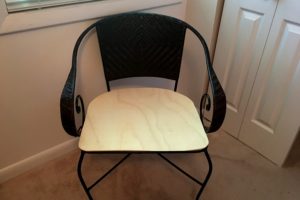How Minimalism Keeps My World Spinning as a Caregiver
Written by |

Being a caregiver for someone with Angelman syndrome means more: more appointments, challenges, changes, and other big things. However, I’m taking a liberating approach to a life of more by countering it with minimalism — a life of less.
It’s more than just a chair
My minimalist habits keep my world going. It’s taken me years to realize that I function best with less. Is there room for minimalism in a life of the unexpected? Absolutely, and I don’t think I could thrive any other way.
A life of minimalism isn’t what most people imagine.
Forget those images of bare rooms with one chair and little else. Minimalism is about removing all of the unimportant things so that you can focus on the most important things in your life. That sounds fantastic to me.
Mrs. Fix-it has left the building
In caregiving, minimalism has come to mean I don’t fix things that can’t be fixed. My daughter Juliana, who turned 11 in February, has Angelman syndrome (AS). I don’t try to fix that, although one day, there could be a cure.
Today, however, I manage things to the best of my ability.
Over the years, I have eased into a lifestyle of less through constant work and awareness. But I frenzied in a tailspin of more when she was younger. Another specialist. One more therapy. A different medicine. I didn’t realize that less can sometimes yield better results than more.
Hitting a proverbial wall hurts, too
Of course, all of the things I just rattled off are important and necessary in special needs living. But to what degree?
In the summer of 2015, while at home with my two girls, I hit a wall and had what I call the Epic Meltdown. I spent the following year facing some stark realizations and doing extensive self-renewal. That’s when I began to understand that more isn’t the answer for me, less is.
Less gives me energy, time, and patience. That’s something I can work with!
I’ve learned the hard way that I can’t live my life like everyone else. More might work for a while. It might work for a lot of people. But when you’re navigating caregiving and unexpected health concerns, less can be a breath of fresh air.
Things that go bump
How do you do less when a life of more seems necessary? It starts with baby steps.
For example, last week we found a strange, new bump on Juliana’s neck. We had spent a lot of time outdoors, so I was sure that it was a mosquito or ant bite. As she dug in and irritated it, the spot became something altogether different.
Her teacher sent a note of concern, and I let her know I was treating it. We didn’t visit the doctor for a new medicine or scan.
The old me, who did more, tried to rear her ugly head, but I knew there was no need to panic or do more than a simple home treatment.
As I write this today, the spot is gone. A few days of aloe vera and Benadryl did the trick.
This is a simple example, and life gets more complicated than a bug bite. However, when I put it all in perspective, I must save my energy for the big things. My response was a minimal remedy, and it was the right one.
In many of our day-to-day situations, less works a whole lot better than more.
Seesaws aren’t only for playing
Sometimes a circumstance or illness requires more. But when more is required in that situation, I can balance it out with less somewhere else.
Picture a seesaw. I’m on one end, and AS is on the other. Up and down we toggle with each new challenge. Can you see how it works?
But I’m not trying to win, because can you really win at seesaw? I’m striking a balance and using my energy for the ups that are coming.
A life of minimalism is not a life of living without. It is simply a life of less.
I use the basic principles to help me maintain a balance that gives me the time and energy to do what matters most.
***
Note: Angelman Syndrome News is strictly a news and information website about the disease. It does not provide medical advice, diagnosis, or treatment. This content is not intended to be a substitute for professional medical advice, diagnosis, or treatment. Always seek the advice of your physician or other qualified health provider with any questions you may have regarding a medical condition. Never disregard professional medical advice or delay in seeking it because of something you have read on this website. The opinions expressed in this column are not those of Angelman Syndrome News, or its parent company, Bionews, and are intended to spark discussion about issues pertaining to Angelman syndrome.








Nicholette Anand
Great article! I also subscribe to this philosophy.
Sabrina L. Johnson
Thank you Nicholette--once you get the hang of "less" it makes things so much easier. I see I'm in good company.
Mary Speiser
As a parent of a child with Prader Willi Syndrome (Angelman's "cousin"), I love your example of minimal responses to minor events/injuries/etc. As you know, in the world of special needs, this is as difficult, or even more difficult in the speical needs world. Substitute blogs and posts from other parents about the tremendous lengths they are taking for their child with the same disorder for commercialism in advertising etc. It is quite the same challenge; learning what you need to do, and skipping over the others that might begin to make you feel you are not doing enough. Thanks for the post.
Sabrina L. Johnson
Hello Mary--I know all about Prader Willi. It was the initial diagnosis for Juliana.
I'm happy to hear from a wise mom who is living the benefits of "less." So tough with all the messages to do more, more, more for our kiddos.
Doesn't it make for such a better balance? Now, we just need to win over everyone else :).
Laura McDonough
Minimalism in senior living apts is vital to get thru the day, house cleaning doesn't get any easier w/ age and arthritis. Daily activities (running errands, exercising daily, routines like cooking meals, laundry, etc) along with caring for spouse w/ health issues
Sabrina L. Johnson
Laura, that is so true. I never thought about it from this perspective, but when you list all of those responsibilities it makes such good sense.